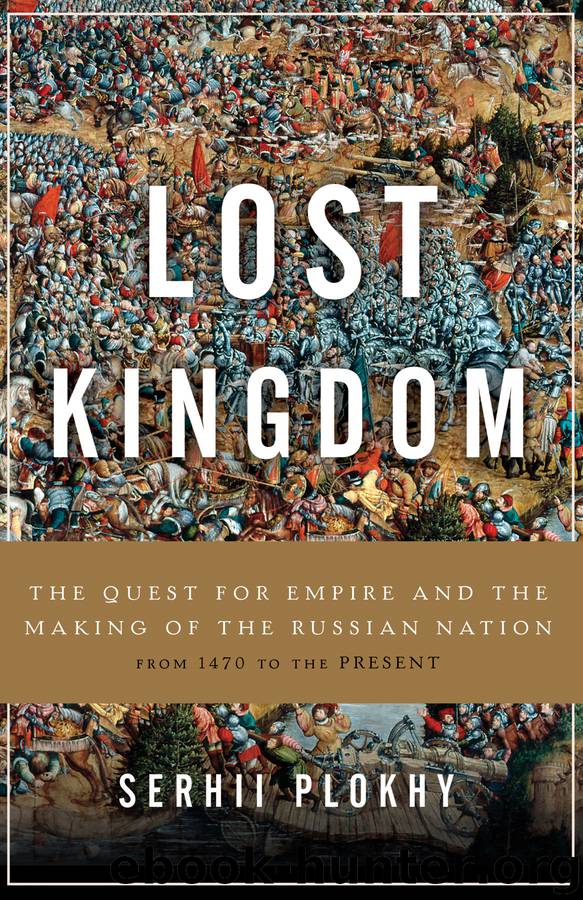Lost Kingdom by Serhii Plokhy

Author:Serhii Plokhy
Language: eng
Format: epub
Publisher: Basic Books
Published: 2017-10-10T04:00:00+00:00
VLADIMIR LENIN NEVER SHARED SHULGIN’S CONCERNS ABOUT the unity of the Russian nation. In June 1917, he went out of his way to manifest his support for the Rada, not only recognizing the Ukrainians as a distinct nation but also endorsing their right to autonomy, or even independence. “The Socialist Revolutionaries and Mensheviks tolerated the fact that the Provisional Government of the Constitutional Democrats, that is, of the counterrevolutionary bourgeois, did not fulfill its elementary democratic duty by failing to announce that it was for the autonomy of Ukraine and its complete freedom to separate,” wrote Lenin.
Lenin saw the Rada as a potential ally in his assault on the Provisional Government, and in November 1917 the Bolsheviks and the Rada did indeed cooperate to expel the government’s supporters from the city. But the situation changed dramatically after the Bolshevik takeover. The Kyiv Bolsheviks tried to gain a majority in the Ukrainian Congress of Soviets convened in Kyiv in December 1917 in order to repeat the Petrograd scenario and seize power in Ukraine in the name of the Soviets, but they found themselves in the minority. The Rada was no longer an ally but an enemy. The Kyiv Bolsheviks moved to Kharkiv, an industrial center close to the border with Russia, and declared the creation of the Ukrainian Socialist Soviet Republic. It claimed the same territory as the Ukrainian People’s Republic, whose formation was declared by the Rada after the Bolshevik coup.
The Rada, as the government of the Ukrainian People’s Republic, refused to recognize the Bolshevik clone or to support Lenin in his struggle against anti-Bolshevik forces, which was more than Lenin and his party comrades could take. As far as they were concerned, the Rada had abused the right of the Ukrainian people to self-determination. In the “Manifesto to the Ukrainian People with an Ultimatum to the Central Rada,” drafted by Lenin along with Leon Trotsky, the second most powerful party and government official, and Joseph Stalin, the commissar for nationalities, the Bolshevik leaders made a contradictory argument, simultaneously recognizing the right of the Ukrainian people to self-determination and denying it in the name of the revolution. They began by asserting their recognition of “the Ukrainian People’s Republic and its right to separate completely from Russia or enter into an agreement with the Russian Republic on federative or similar mutual relations between them.” They then revoked their recognition of the Ukrainian government, claiming that it had an “ambiguous policy, which makes it impossible for us to recognize the Rada as a plenipotentiary representative of the workers and exploited masses of the Ukrainian Republic.”
At stake was the Central Rada’s neutrality with regard to the conflict between the Bolshevik government in Petrograd and commanders of the former Russian imperial army who had remained loyal to the Provisional Government and established their base of operations in the Don region of southern Russia. Lenin wanted the Rada to stop disarming Bolshevik formations in Ukraine, block the access of the anti-Bolshevik forces to the Don region, and join his government in a war against the opponents of the Bolshevik regime in Ukraine.
Download
This site does not store any files on its server. We only index and link to content provided by other sites. Please contact the content providers to delete copyright contents if any and email us, we'll remove relevant links or contents immediately.
| Anthropology | Archaeology |
| Philosophy | Politics & Government |
| Social Sciences | Sociology |
| Women's Studies |
The Secret History by Donna Tartt(19023)
The Social Justice Warrior Handbook by Lisa De Pasquale(12182)
Thirteen Reasons Why by Jay Asher(8881)
This Is How You Lose Her by Junot Diaz(6868)
Weapons of Math Destruction by Cathy O'Neil(6260)
Zero to One by Peter Thiel(5779)
Beartown by Fredrik Backman(5729)
The Myth of the Strong Leader by Archie Brown(5491)
The Fire Next Time by James Baldwin(5421)
How Democracies Die by Steven Levitsky & Daniel Ziblatt(5208)
Promise Me, Dad by Joe Biden(5139)
Stone's Rules by Roger Stone(5077)
A Higher Loyalty: Truth, Lies, and Leadership by James Comey(4945)
100 Deadly Skills by Clint Emerson(4910)
Rise and Kill First by Ronen Bergman(4771)
Secrecy World by Jake Bernstein(4736)
The David Icke Guide to the Global Conspiracy (and how to end it) by David Icke(4695)
The Farm by Tom Rob Smith(4499)
The Doomsday Machine by Daniel Ellsberg(4480)
